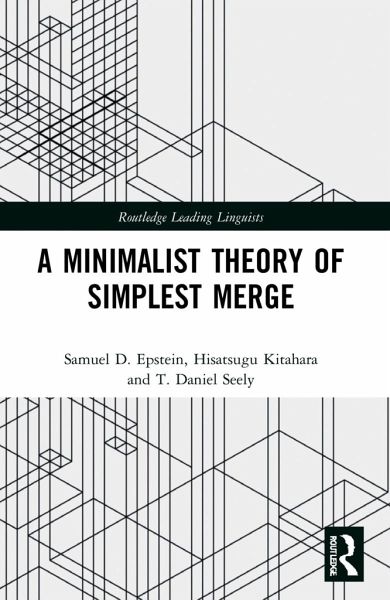
A Minimalist Theory of Simplest Merge
Versandkostenfrei!
Versandfertig in 6-10 Tagen
38,99 €
inkl. MwSt.
Weitere Ausgaben:

PAYBACK Punkte
19 °P sammeln!
This collection explicates one of the core ideas underpinning Minimalist theory - explanation via simplification - and its role in shaping some of the latest developments within this framework, specifically the simplest Merge hypothesis and the reduction of syntactic phenomena to third factor considerations.Bringing together recent papers on the topic by Epstein, Kitahara, and Seely, with one by Epstein, Seely and Obata, and one by Kitahara, the book begins with an introduction which situates the papers in a cohesive overview of some of the latest research on Minimalism, as facilitated by curr...
This collection explicates one of the core ideas underpinning Minimalist theory - explanation via simplification - and its role in shaping some of the latest developments within this framework, specifically the simplest Merge hypothesis and the reduction of syntactic phenomena to third factor considerations.
Bringing together recent papers on the topic by Epstein, Kitahara, and Seely, with one by Epstein, Seely and Obata, and one by Kitahara, the book begins with an introduction which situates the papers in a cohesive overview of some of the latest research on Minimalism, as facilitated by current theoretical developments. The volume integrates a historical overview of evolutions in Merge, starting with Chomsky's (pre-Merge) Aspects model up to current theoretical models, including a primer of Chomsky's most recent theory of Merge based on the concept of Workspace. The Minimalist notions of "perfection" and "simplification" are also outlined, providing clearly explicated coverage of key technical concepts within the framework as applied to grammatical phenomena.
Taken as a whole, the collection both introduces and advances Minimalist theory for students and scholars in linguistics and related sub-disciplines of psychology, philosophy, and cognitive science, as well as offering new directions for future research for researchers in these fields.
Bringing together recent papers on the topic by Epstein, Kitahara, and Seely, with one by Epstein, Seely and Obata, and one by Kitahara, the book begins with an introduction which situates the papers in a cohesive overview of some of the latest research on Minimalism, as facilitated by current theoretical developments. The volume integrates a historical overview of evolutions in Merge, starting with Chomsky's (pre-Merge) Aspects model up to current theoretical models, including a primer of Chomsky's most recent theory of Merge based on the concept of Workspace. The Minimalist notions of "perfection" and "simplification" are also outlined, providing clearly explicated coverage of key technical concepts within the framework as applied to grammatical phenomena.
Taken as a whole, the collection both introduces and advances Minimalist theory for students and scholars in linguistics and related sub-disciplines of psychology, philosophy, and cognitive science, as well as offering new directions for future research for researchers in these fields.














